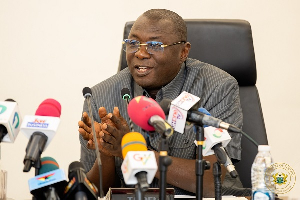Business News of Monday, 7 October 2024
Source: GNA
Dr Mohammed Amin Adam, Finance Minister, says foreign companies are returning to Ghana due to the country’s economic rebound.
He said just as it was heard of some foreign companies exiting the country due to the economic hardship, many had started returning, owing to the positive growth in the first half of 2024.
He was speaking at the second Quarterly Economic Roundtable discussion held in Accra, on Monday, October 7, on the theme: “Driving economic growth through Small and Medium-sized Enterprises (SMEs).”
It was jointly organised by the Ministry of Finance and the University of Ghana.
“We were told that some companies left Ghana when the economy went down, and it’s important to note that companies are returning to Ghana because they see that the growth trajectory is positive,” Dr Amin Adam, said.
“The latest is Virgin Atlantic (an airline company who left the country in 2013), which said only yesterday (October 6, 2024) that they’ve returned to Ghana to operate as an airline because they see economic recovery,” he noted.
The Finance Minister indicated that there were some other companies that were also returning to the country, but yet to be heard of.
“Let’s get ready for them to build strong partnerships, and use that capital, expertise and technology that they’re bringing in so that we can leverage them to support the growth of the economy,” Dr Amin Adam told Ghanaian businesses.
Referencing figures from the Ghana Statistical Service (GSS), he stated that the economic growth for 2024 was exceeding every expectation, prompting major analysts and keen observers to revise their projections upwards.
The Minister noted that the country’s half year Gross Domestic Product (GDP) growth of 5.8 per cent for 2024 was the highest in the last five years, which was a testament that the economy was “back on track.”
“It is fascinating to note that the growth of 4.8 per cent in quarter one and 6.9 per cent in quarter two was driven largely by industry and agriculture sectors, for quarter two, all three sectors, including services drove the growth,” he said.
“What this means is that we are back on track. It also means that our policies to support the private sector are having significant impact. Economic actors in these sectors are receiving needed support,” the Finance Minister said.
He encouraged all Ghanaians to be guided by unity of purpose on SMEs to consolidate the strides made in fiscal consolidation, debt restructuring, and economic reforms.
Pledging the government’s sustained support to SMEs, he said, “you are not alone or lonely. You are priority of the Ghanaian society and this Government. We will not fail you.”
Mr Kyle Kelhofer, Senior Country Manager, International Finance Corporation (IFC), noted that the current macroeconomic landscape in Ghana required a resilient, flexible and innovative structures.
He called for a concerted effort from all stakeholders, including financial institutions, academia, government, and the private sector, to drive sustainable economic growth through SMEs.
Professor Nana Aba Appiah Amfo, Vice- Chancellor, University of Ghana, encouraged all stakeholders to ensure that the ideas and recommendations from the discussions were translated into actions that would improve development outcomes and the wellbeing of Ghanaians.
She reiterated that SMEs, remained the backbone of the Ghanaian economy, as they provided jobs and contributed significantly to GDP.
She recommended that policy interventions were directed at solving the cumbersome regulatory processes, limited access to finance, complex tax systems and high utility tariffs, which often hampered growth of SMEs.
 Kanawu Radio number 1 news portal
Kanawu Radio number 1 news portal

